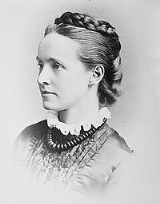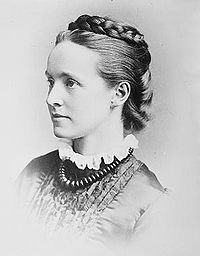
Conservative and Unionist Women's Franchise Association
Encyclopedia
The Conservative and Unionist Women's Franchise Association (CUWFA) was a British women's suffrage
organisation open to members of the Conservative and Unionist Party
. Formed in 1908 by members of the National Union of Women's Suffrage Societies
, CUWFA was the third-largest suffrage organisation in Britain before the First World War.
 CUWFA was initially made up of Conservative members of the National Union of Women's Suffrage Societies
CUWFA was initially made up of Conservative members of the National Union of Women's Suffrage Societies
(NUWSS), who at the suggestion of Millicent Fawcett
identified themselves as a separate group at the NUWSS march in June 1908. The Association was formally created in November 1908 as a result of this march, and was open to members of the Conservative and Unionist Party
who supported the "extension of the Franchise to all duly qualified women". Unlike other conservative organisations such as the Primrose League
, CUWFA was a single-issue
organisation interested only in the enfranchisement of women.
The Association was formed for various reasons. The creation of organisations such as the Men's League for Opposing Woman Suffrage
in the Conservative Party meant that the Party was in danger of becoming largely anti-suffragist
unless effective opposition could be organised. In addition the Liberal
and Labour
Parties held the majority in the House of Commons, and as both supported the Suffrage movement it was thought "inevitable" that a bill granting women the right to vote would be pushed through Parliament. The formation of an organised group of Conservatives to promote women's suffrage would prevent the Conservative Party being politically outflanked on the issue. If the Conservative Party became more moderate on the issue of women's suffrage they could play some part in moderating the eventual bill, rather than simply protesting as the Liberal-Labour majority pushed it through Parliament. A Conservative pro-suffrage group was also intended to prevent pro-suffrage women and men leaving the Conservative Party, which would damage the party's standing.
, three Marchioness
es, four Earl
s and many other members of the nobility working for the Association. By 1913 the Association had 61 different local branches, including one in Ireland which was opened in 1909.
accused them of threatening to withdraw support from Conservative candidates who did not support the Conciliation Bill
they denied this, claiming they did not act against anti-suffragist Conservative candidates. They were helpful in stymieing the Anti-suffragist
movement by denying them support in the Conservative Party, which they had considered to be a bastion of support. They ran two newspapers, the Conservative and Unionist Women's Franchise Review and the Monthly News of the Conservative and Unionist Women's Franchise Association. The Association became inactive in 1914, when the outbreak of the First World War forced them to suspend their activities. The Representation of the People Act 1918
, passed after the end of the First World War, granted the right to vote to the women that the Association had been representing, making their continued existence moot.
Women's suffrage
Women's suffrage or woman suffrage is the right of women to vote and to run for office. The expression is also used for the economic and political reform movement aimed at extending these rights to women and without any restrictions or qualifications such as property ownership, payment of tax, or...
organisation open to members of the Conservative and Unionist Party
Conservative Party (UK)
The Conservative Party, formally the Conservative and Unionist Party, is a centre-right political party in the United Kingdom that adheres to the philosophies of conservatism and British unionism. It is the largest political party in the UK, and is currently the largest single party in the House...
. Formed in 1908 by members of the National Union of Women's Suffrage Societies
National Union of Women's Suffrage Societies
The National Union of Women's Suffrage Societies , also known as the Suffragists was an organisation of women's suffrage societies in the United Kingdom.-Formation and campaigning:...
, CUWFA was the third-largest suffrage organisation in Britain before the First World War.
Formation

National Union of Women's Suffrage Societies
The National Union of Women's Suffrage Societies , also known as the Suffragists was an organisation of women's suffrage societies in the United Kingdom.-Formation and campaigning:...
(NUWSS), who at the suggestion of Millicent Fawcett
Millicent Fawcett
Dame Millicent Garrett Fawcett, GBE was an English suffragist and an early feminist....
identified themselves as a separate group at the NUWSS march in June 1908. The Association was formally created in November 1908 as a result of this march, and was open to members of the Conservative and Unionist Party
Conservative Party (UK)
The Conservative Party, formally the Conservative and Unionist Party, is a centre-right political party in the United Kingdom that adheres to the philosophies of conservatism and British unionism. It is the largest political party in the UK, and is currently the largest single party in the House...
who supported the "extension of the Franchise to all duly qualified women". Unlike other conservative organisations such as the Primrose League
Primrose League
The Primrose League was an organisation for spreading Conservative principles in Great Britain. It was founded in 1883 and active until the mid 1990s...
, CUWFA was a single-issue
Single-issue politics
Single-issue politics involves political campaigning or political support based on one essential policy area or idea.-Political expression:...
organisation interested only in the enfranchisement of women.
The Association was formed for various reasons. The creation of organisations such as the Men's League for Opposing Woman Suffrage
Men's League for Opposing Woman Suffrage
The Men's League for Opposing Woman Suffrage was founded on 19 January 1909 with Lord Cromer as President, replacing the Men's Committee for Opposing Woman Suffrage, which had been founded in December 1908...
in the Conservative Party meant that the Party was in danger of becoming largely anti-suffragist
Anti-suffragism
Anti-suffragism was a political movement composed mainly of women, begun in the late 19th century in order to campaign against women's suffrage in the United States and United Kingdom...
unless effective opposition could be organised. In addition the Liberal
Liberal Party (UK)
The Liberal Party was one of the two major political parties of the United Kingdom during the 19th and early 20th centuries. It was a third party of negligible importance throughout the latter half of the 20th Century, before merging with the Social Democratic Party in 1988 to form the present day...
and Labour
Labour Party (UK)
The Labour Party is a centre-left democratic socialist party in the United Kingdom. It surpassed the Liberal Party in general elections during the early 1920s, forming minority governments under Ramsay MacDonald in 1924 and 1929-1931. The party was in a wartime coalition from 1940 to 1945, after...
Parties held the majority in the House of Commons, and as both supported the Suffrage movement it was thought "inevitable" that a bill granting women the right to vote would be pushed through Parliament. The formation of an organised group of Conservatives to promote women's suffrage would prevent the Conservative Party being politically outflanked on the issue. If the Conservative Party became more moderate on the issue of women's suffrage they could play some part in moderating the eventual bill, rather than simply protesting as the Liberal-Labour majority pushed it through Parliament. A Conservative pro-suffrage group was also intended to prevent pro-suffrage women and men leaving the Conservative Party, which would damage the party's standing.
Organisation
Immediately after being formed the Association invited Lady Knightley to become the first President. Lady Selborne took over as President in 1910, and continued as such until 1913, when she was succeeded by the Countess of Fingall. The Presidents were assisted by "an impressive array of eminently titled vice-presidents"; in 1913 there were three DuchessesDuke
A duke or duchess is a member of the nobility, historically of highest rank below the monarch, and historically controlling a duchy...
, three Marchioness
Marchioness
Marchioness could refer to:*A noblewoman with the rank of Marquess, or the wife of a Marquess.*The Marchioness, a pleasure boat that was sunk on the River Thames in 1989....
es, four Earl
Earl
An earl is a member of the nobility. The title is Anglo-Saxon, akin to the Scandinavian form jarl, and meant "chieftain", particularly a chieftain set to rule a territory in a king's stead. In Scandinavia, it became obsolete in the Middle Ages and was replaced with duke...
s and many other members of the nobility working for the Association. By 1913 the Association had 61 different local branches, including one in Ireland which was opened in 1909.
Activities
The Association attempted to return Members of Parliament who supported the enfranchisement of "all duly qualified women", and educated such "qualified women" in how to exercise their right to vote once it became available. Although The TimesThe Times
The Times is a British daily national newspaper, first published in London in 1785 under the title The Daily Universal Register . The Times and its sister paper The Sunday Times are published by Times Newspapers Limited, a subsidiary since 1981 of News International...
accused them of threatening to withdraw support from Conservative candidates who did not support the Conciliation Bill
Conciliation Bills
Three Conciliation bills were put before the House of Commons, one each year in 1910, 1911 and in 1912 which would extend the right of women to vote in the United Kingdom of Great Britain and Ireland to around 1,000,000 wealthy, property-owning women....
they denied this, claiming they did not act against anti-suffragist Conservative candidates. They were helpful in stymieing the Anti-suffragist
Anti-suffragism
Anti-suffragism was a political movement composed mainly of women, begun in the late 19th century in order to campaign against women's suffrage in the United States and United Kingdom...
movement by denying them support in the Conservative Party, which they had considered to be a bastion of support. They ran two newspapers, the Conservative and Unionist Women's Franchise Review and the Monthly News of the Conservative and Unionist Women's Franchise Association. The Association became inactive in 1914, when the outbreak of the First World War forced them to suspend their activities. The Representation of the People Act 1918
Representation of the People Act 1918
The Representation of the People Act 1918 was an Act of Parliament passed to reform the electoral system in the United Kingdom. It is sometimes known as the Fourth Reform Act...
, passed after the end of the First World War, granted the right to vote to the women that the Association had been representing, making their continued existence moot.

